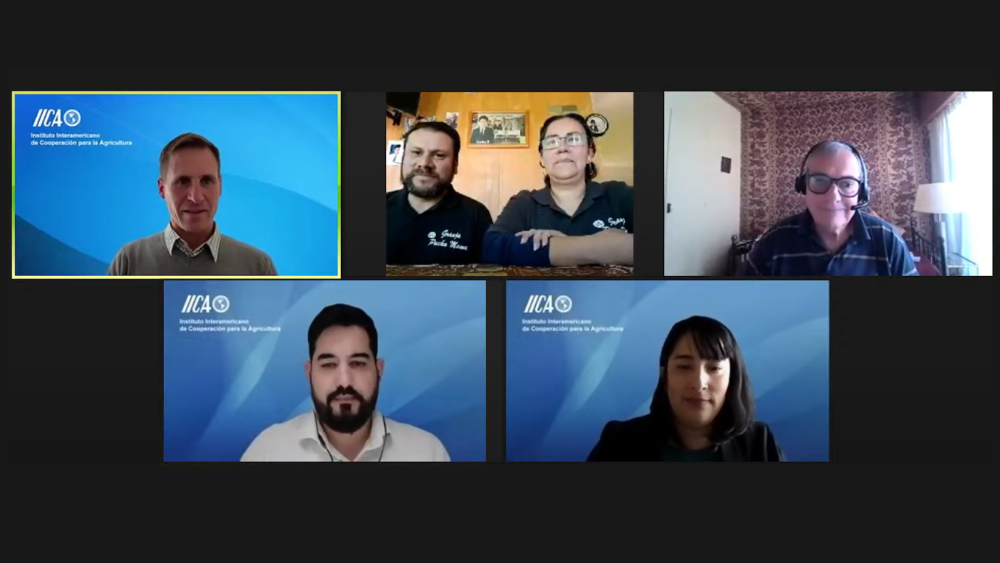Digital technology provides tools to predict and mitigate the impact of droughts on agriculture, says study presented by IICA

San José, May 17, 2024 (IICA). Digital technology provides extremely useful tools to diagnose and mitigate the impacts of droughts, reveals a study presented by the Inter-American Institute for Cooperation on Agriculture (IICA) in preparation for the third edition of Digital Agriculture Week (DAW 2024), which will take place next September.
The document gives details of a cross-section of digital resources produced by public and private entities in Latin America and the Caribbean that help forecast and tackle water crises, which are increasing in number and severity due to climate change.
DAW 2024, whose official launch took the form of a series of webinars in which the topics to be discussed were announced, will bring together AgTechs, investment funds, large companies, farmer organizations, research institutes, ministries, public entities, and multilateral organizations to discuss digitalization in the agrifood sector and promote collaboration. IICA has spearheaded the initiative since 2022, and this year’s edition is again being organized jointly with strategic partners of the Institute such as CAF-Development Bank of Latin America, ECLAC, and CIMMYT.
The closing date for applications to participate for AgTechs in the Americas that have ready-to-use digital solutions is July 1, and the form can be downloaded from the web page (www.semanaad.iica.int). Fifteen AgTechs will be selected to travel to San José, Costa Rica, from September 23 and 27, with all expenses paid, while those that are not chosen to travel will be able to participate virtually and join IICA’s AgTech Network of the Americas.
The participants in the webinar discussed the role that technologies can play in predicting and mitigating the effects of droughts and increasing resilience.
“Every time there is a drought, thousands or millions of agricultural producers and all societies are affected, because there is less food produced and available. There are countless examples in history of the dramatic impact of droughts. Today, climate change is triggering more frequent and more extreme droughts and floods. The good news is that the countries of the Americas have more and more tools to reduce the impact of these situations a little more each time,” said Federico Bert, Manager of IICA’s Digitalization of Agrifood Systems Program.
One of the authors of the study, academic Guillermo Podesta, pointed out that there are three main areas in which digital technologies can be of use in dealing with droughts: monitoring, forecasting and early warning; risk and impact characterization and management; and planning, preparedness and responses.
“The complex nature of drought makes it difficult to manage. But more public and private resources are being made available for monitoring and managing this threat. Most of them did not exist 10 or 15 years ago,” Podesta said.
“Technology is necessary, but not enough,” he warned. “Proactive rather than reactive approaches are needed from governments.”
Chilean farmers Macarena Valdés and Marco Aceituno, founders and owners of Granja La Pachamama, also took part in the webinar. Their food production business has prospered despite the severe drought that has hit the country in recent years, making the idea of producing more with less a reality. Both were recognized as “Leaders of Rurality of the Americas” by the Inter-American Institute for Cooperation on Agriculture (IICA) due to their contribution to food security and environmental sustainability of the continent and the planet.
“As a matter of survival, we began to apply techniques designed to improve the quality of the soil and regenerate it. As a result, we began producing different products that complement each other and generated a circular economy,” they said.
Macarena and Marco described how they began using hydroponic green fodder to feed livestock and then also started using it as ground cover for the soil.
The farming couple also explained that although last year the central region of Valparaíso where they live and farm received only 50 millimeters of rain, they were able to adapt to the situation: “We collect rainwater from the roofs and store it in tanks, so we can irrigate our 300 fruit trees throughout the year.”
The document: La sequía en la agricultura: recursos digitales disponibles para diagnosticar su ocurrencia y reducir sus impactos en América Latina y el Caribe is available at: https://repositorio.iica.int/handle/11324/22502
More information:
Institutional Communication Division.
comunicacion.institucional@iica.int